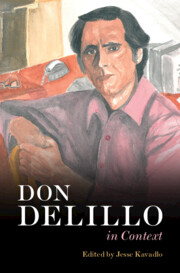Book contents
- Don DeLillo In Context
- Don DeLillo In Context
- Copyright page
- Contents
- Contributors
- Acknowledgments
- Abbreviations
- Introduction: Context, Content, Conflict
- Part I Places
- Part II History and Politics
- Part III Media and Pop Culture
- Part IV Literary Contexts
- Chapter 16 Intertextuality
- Chapter 17 Genre and Genre Theory
- Chapter 18 Modernism and Postmodernism
- Chapter 19 Postmodernism and Literary Criticism
- Part V Material Contexts
- Part VI Social and Cultural Constructions
- Part VII Writing and Writers
- Further Reading
- Index
- References
Chapter 17 - Genre and Genre Theory
Bold New Forms: Genre and the Generic
from Part IV - Literary Contexts
Published online by Cambridge University Press: 19 May 2022
- Don DeLillo In Context
- Don DeLillo In Context
- Copyright page
- Contents
- Contributors
- Acknowledgments
- Abbreviations
- Introduction: Context, Content, Conflict
- Part I Places
- Part II History and Politics
- Part III Media and Pop Culture
- Part IV Literary Contexts
- Chapter 16 Intertextuality
- Chapter 17 Genre and Genre Theory
- Chapter 18 Modernism and Postmodernism
- Chapter 19 Postmodernism and Literary Criticism
- Part V Material Contexts
- Part VI Social and Cultural Constructions
- Part VII Writing and Writers
- Further Reading
- Index
- References
Summary
Don DeLillo, this chapter argues, has created innovative narratives from the typecast materials of popular genre fiction. It demonstrates that genre novels and films, from spy thrillers and noir to mafia stories and horror, have often served DeLillo as, counterintuitively, a blank canvas – not as a narrowing template or pre-determined plot but as grounds for subversion, especially of the ideologies popular genres tend to encode, including the myths of individual agency with which DeLillo’s characters often strongly (and wrongheadedly) identify. DeLillo has remained interested in responding to generic narratives throughout his nearly fifty-year career because genres’ tired conventions and predictable endings often act as foils to his far more distinctive explorations of violence and death, that real-world ending, particularly in his late-career invocations of horror. The chapter examines primarily examples from Running Dog, Players, Libra, Underworld, The Body Artist, and Point Omega.
Keywords
- Type
- Chapter
- Information
- Don DeLillo In Context , pp. 165 - 171Publisher: Cambridge University PressPrint publication year: 2022

